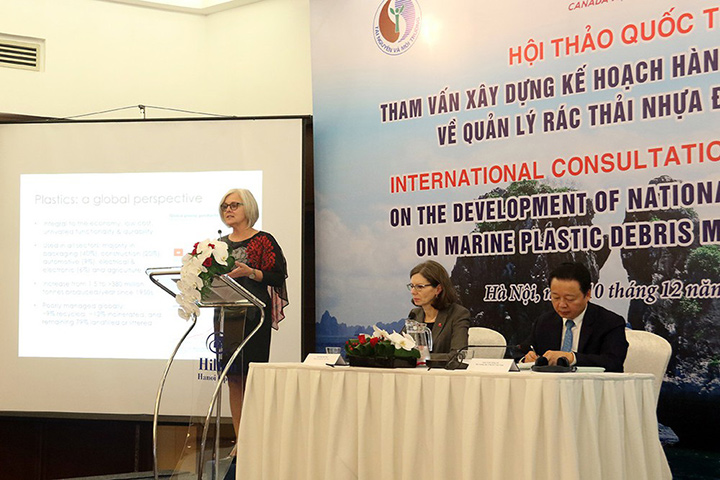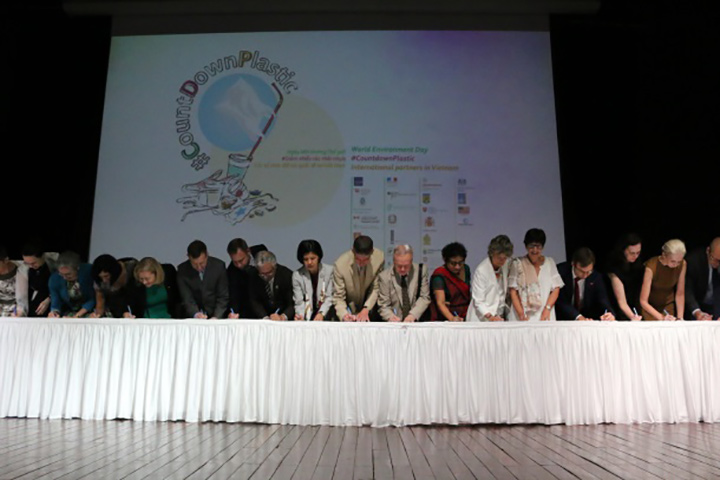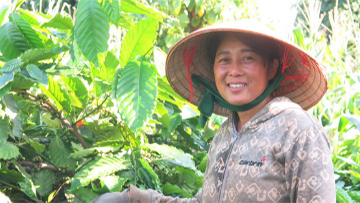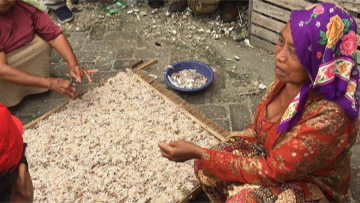Combatting plastic waste in Vietnam: An action plan for a more sustainable future

Men and women fish on the Vietnamese coast. Photo: Nguyen Thanh Cuong
Follow:
When climate change and pollution threaten people’s daily lives, it’s time to take action.

In Vietnam, the detrimental effects of climate change and pollution are undeniable.
Sea level rise causes flooding in coastal farmland, forcing farmers to abandon their livelihoods. Plastic waste in the ocean enters the food chain, directly impacting human health. Burning plastic releases toxins into the air, causing higher death rates linked to heart disease, stroke and lung cancer.
All the while, climate change makes the country even more vulnerable to devastating weather-induced natural disasters such as typhoons and landslides.
As one of the top five countries contributing to ocean plastics, activists, scientists and business leaders in Vietnam have recognized it’s time for change and the Embassy of Canada to Vietnam is proud to be a partner in addressing plastic pollution.
Finding solutions: recycling, data, empowering women and more

Vietnam is developing a National Action Plan on Marine Plastic Debris Management.
Along with Vietnam’s Ministry of Natural Resources and Environment, the Embassy of Canada to Vietnam hosted a workshop for policy makers, environmental activists and business leaders to discuss solutions to ocean plastic waste problems. These insights will be given as input to Vietnam’s National Action Plan. Environment and Climate Change Canada also shared Canada’s experience in reducing plastic waste.
Some participants suggested Vietnam’s recycling industry needs to be further developed, from sorting to collection to treatment. Creating a more viable recycling industry would also help create market opportunities for private investment and reduce the need for public funds.
Participants also emphasized the need to conduct reliable research and analysis on land-based and sea-based plastic waste. Systematic data would enable policy makers to formulate policies and laws based on evidence.
Although women play an important role in waste management in Vietnam, they are not adequately recognized in government policies and programs. Participants emphasized that by studying the particular roles of women in the waste management chain, including as entrepreneurs, informal waste collectors and at the household level, Vietnam could empower women and address plastic waste at the same time.
Next steps to turn this plan into action include:
- enhancing management capacity and existing international frameworks to improve policy-making mechanisms
- improving research capacity on marine litter and micro plastics
- increasing public awareness about plastic pollution
- promoting investments in infrastructure development
The fight back against plastic waste

This workshop builds on the Canadian embassy’s leadership in helping address plastic pollution in Vietnam.
In 2018, the embassy led efforts to develop a Code of Conduct to Combat Plastic Pollution. Over 60 international organizations and diplomatic missions have committed to reducing the use of single-use plastics in the workplace, making operational changes to minimize their plastic waste footprint and encouraging their partners to adopt low or no plastic waste-emitting options.
"Plastic is damaging our oceans, lakes and rivers. We all have a role to play in combatting plastic pollution."
Agents of change
While some progress has been made through plastic waste collection systems and landfill management, that’s not where efforts end in the battle against plastic waste in Vietnam.
Throughout its G7 presidency, Canada has advanced global and domestic action on marine plastic litter and ocean preservation. To support the G7 Oceans plastics charter, Canada is investing $100 million to support developing countries in reducing ocean pollution.
Vietnam has also committed to significantly reducing its pollution by 2025, through its newly revised National Strategy for Integrated Solid Waste Management.
With these promising plans for action, Canada is a proud partner of Vietnam on the road to a zero-plastic waste future.
Related Links
External links
- Date modified:


